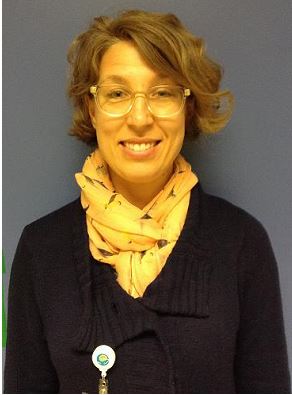- Tell us about yourself: Christy Swan. I completed Principal Certification in 2016
- What are you doing now?: Assistant Principal of Chester and Ponderosa Elementary in Central Valley School District
- Why did you choose a program in the School of Education at Gonzaga? Not only does Gonzaga have a stellar reputation for education, it also met my needs for earning my certificate while teaching and completing an internship. The pace of the program was ideal, allowing me to finish my work in a year.
- What influenced you the most during your time at Gonzaga? Dr. Cynthia Johnson had a huge impact on my work. She pushed my thinking and offered experiences that challenged me while also helping to develop my confidence in school leadership. Cindy was supportive, encouraging, and without a doubt an advocate for all in the program. It was, and still is, her main focus that all candidates leave ready to enter the field of school leadership and do so with passion and excitement.
- What was your greatest lesson learned at Gonzaga? The greatest lesson I learned at Gonzaga was the power of a cohort. I believe working through the program with others was pivotal in helping me feel supported and engaged. We were all able to share experiences, grow one another’s thinking, and celebrate our successes.
- What is the most rewarding aspect of working in your field? Most challenging? Hands down, the most rewarding part of working in my field is serving others. It is my “why.” My purpose for coming to work each day is to serve those around me and to ensure that their needs are met. I am lucky enough to work with amazing students, teachers, support staff, administrators, parents, and community members. The most challenging part of my job is there are not nearly enough hours in the day to do all I believe is necessary to fulfill my role. With that challenge, I have learned to balance my time prioritize my “to do” and enjoy the ride!
- What critical issues do you see that need to be addressed in your field? A critical issue I believe that needs to be addressed in education is the mental health of students. We serve many students of complex trauma and other outside factors that need support. Currently, we are limited in all that we can do to help these young kids.
- What advice do you have for future education professionals? Make sure you know your “why.” It guides you in all that you do.
Tag: soe
- Tell us about yourself: I received both my B.Ed. and M.Ed. in Special Education, 2002 and 2008 respectfully, from Gonzaga University. I received my PhD in School Psychology from the University of Iowa in August of 2016.
- What are you doing now?: I am currently a psychology fellow at the Seattle Children’s Autism Center working in the Biobehavioral and the ABA Early Intervention programs. I specialize in assessing and treating challenging behaviors that often are associated with autism and other disabilities. I have accepted a position with the Child Development Center in Missoula, MT and I will start in October 2017.
- Why did you choose a program in the School of Education at Gonzaga? At the beginning, I just wanted to be at Gonzaga University and I was undecided between majors and academic programs. I was involved in several sports when I was younger and I thought coaching would eventually be in my future. Most of my former coaches were teachers so registered for my first education class with Dr. Tim McLaughlin. I remember loving the discussions in that class and he inspired me to pursue special education. The next semester, I registered for applied behavior analysis (ABA) with Dr. Randy Williams. ABA was life changing for me. Understanding and analyzing the concept of learning through the principles of reinforcement and punishment made intuitive sense to me. I knew I was in the right program after taking that course!
- What influenced you the most during your time at Gonzaga?Each member of the faculty reach out to me, taught me critical skills, and believed in me in different ways throughout my Gonzaga career. Tim was influential in getting me started down the path of special education and for advising throughout my undergrad. Randy was influential in teaching me the foundational principles of ABA and modeling ABA in his teaching. Mark (Derby) was influential by convincing me to pursue my masters at a time when I was so unsure of what to do with my life. Kim (Weber) is influential by modeling leadership and advocacy, not only for the population of students that special educators serve, but for her undergrad and graduate students. Anjali (Barretto) was influential by simultaneously modeling passion for our science and compassion for all the children who walk in our doors. She was also instrumental in my choice to pursue my PhD at University of Iowa and to work with Dave Wacker. It was the most difficult, but by far the most rewarding choice of my life.
- What was your greatest lesson learned at Gonzaga? Gonzaga taught me several valuable lessons two of which come immediately to mind. First, I learned is that Gonzaga will always be a second home and Gonzaga’s faculty, staff, and fellow alumni are family. Between graduating from Gonzaga with my bachelor’s and coming back to earn my master’s, I sustained a life-changing traumatic brain injury (TBI). I was at St. Luke’s Rehabilitation and Deaconess for several weeks. But the time went by fast because I had so many visitors. Tim and Randy among them. As soon as I could, I began volunteering at Gonzaga as a rowing assistant coach and would walk across campus to visit the SPED faculty regularly. I was always welcome at Gonzaga! Learning how to navigate the world of disability while showing individuals their true abilities was the second lesson I Iearned at Gonzaga. From writing an individual education plan (IEP) to researching rare genetic syndromes, I learned that that the word “disability” is multi-faceted. At the same time, every individual has amazing abilities.
- What is the most rewarding aspect of working in your field? Most challenging? Strength: Seeing the growth in a child and showing parents their child’s strengths through your data. For example, I recently saw a 5-year-old girl with destructive behavior. Her mother just wanted to keep her safe. We implemented a play intervention to teach her to play with her toys instead of throwing them and the outcomes were successful. Her mother was brought to tears when she saw her daughter playing and said, “she has never done that before!”Challenge: Keeping up with the need.
- What critical issues do you see that need to be addressed in your field? Making quality services more accessible.
- What advice do you have for future education professionals? “When in doubt… persist, don’t punt.” A quote from Dave Wacker.
Over the last few years, our departments have worked to create dynamic, new offerings that meet the demands of the ever-changing world. This required comprehensive reviews of our current curriculum, identification and development of new material, and the willingness to evolve to stay ahead of the curve. The dedication and effort of our faculty is apparent as we are launching two new programs in the coming year: our Doctor of Educational Leadership (Ed.D.) and Master of Education in Educational Leadership (online).The new programs increase our program offerings to 3 Undergraduate majors and 16 Graduate or Doctoral options across five academic departments.
- Our Ed.D., housed in the Department of Educational Leadership & Administration, will enroll the first cohort in Summer 2018. This 51-credit hybrid program prepares candidates for administrative, academic, professional, and research positions in education, civil organizations, private organizations, and public institutions. In American universities, the Ed.D. is recognized as qualification for appointment as a professor.
- Our Master of Education in Educational Leadership (online), also housed in the Department of Educational Leadership & Administration, will enroll the first cohort in Summer 2018. This degree is designed for working educators, with a focus on linking theory and research to practical issues in teaching and leadership using their local districts as the context for their study. Students are welcomed into an online cohort of educators and experience the benefits of a collaborative learning community delivered in a dynamic, fostering environment.
The application for admission to each program is open and we are already reviewing potential candidates’ applications. Spread the word: Apply Today!
For 40 years, the Department of Educational Leadership and Administration (DELA) has provided high quality masters programs across British Columbia (BC) and Alberta (AB), graduating knowledgeable, skilled, and committed leaders who operate from a strong value base. This year marked the 40th anniversary of program offerings in Canada, and three celebrations were held across the provinces over the summer. Faculty, alumni, and friends of the program united in Victoria, BC; Kelowna, BC; and Calgary, AB, for food, fellowship, and festivity. “The impact of our graduates reaches nearly everywhere across BC and AB,” Dean Alfonso remarked. “We are proud to celebrate our alumni and our department on this impressive milestone.”
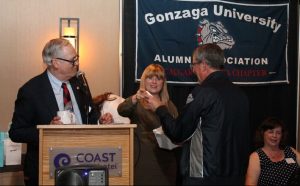
40th Anniversary Celebration in Kelowna, BC.

40th Anniversary Celebration in Kelowna, BC.
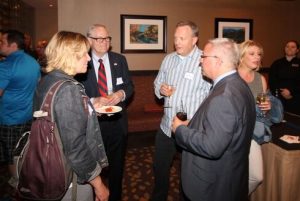
40th Anniversary Celebration in Kelowna, BC.
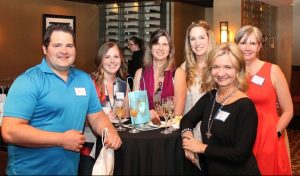
40th Anniversary Celebration in Kelowna, BC.
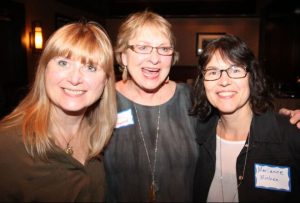
40th Anniversary Celebration in Kelowna, BC.
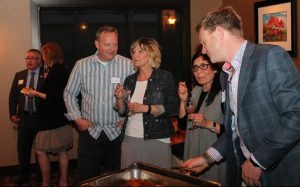
40th Anniversary Celebration in Kelowna, BC.
